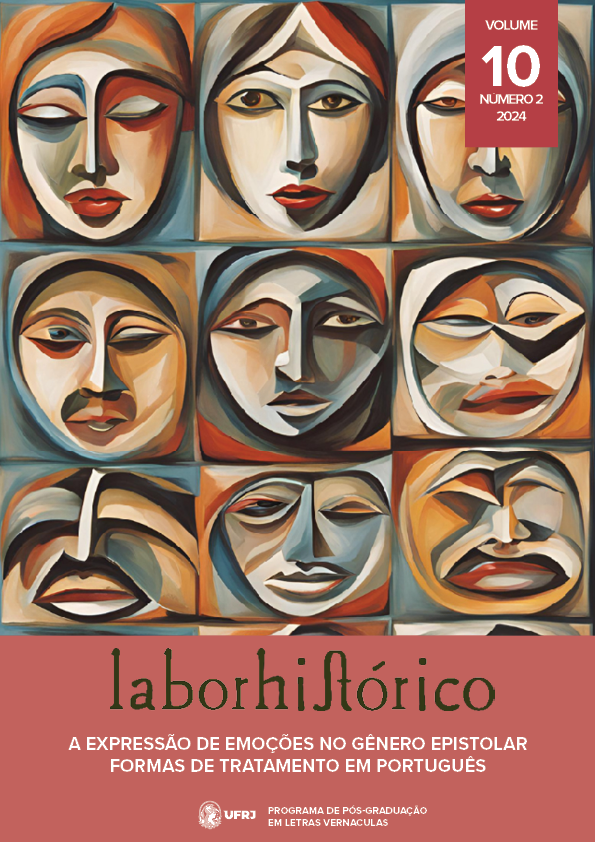A importância da tradição epistolar para o letramento na Educação Básica
DOI:
https://doi.org/10.24206/lh.v10i2.62158Palabras clave:
Gênero textual carta, Tradição epistolar, Letramento, Educação básica, Cultura digitalResumen
Este estudo apresenta proposta de atividades didáticas fundamentadas no gênero textual carta pessoal, aplicadas nos anos finais do Ensino Fundamental I. O objetivo principal é enriquecer o processo de aprendizagem, considerando a importância do gênero textual da carta pessoal como meio de expressão e de comunicação interpessoal em um tempo de uso intenso dos meios digitais. Para atingir esse objetivo, a pesquisa empregou uma metodologia mista, combinando pesquisa bibliográfica e análise de casos práticos desenvolvidos nas séries finais do Ensino Fundamental I. Na fundamentação teórica, autores como Abreu e Munhoz (2019), Rojo (2009) e Soares (2008) destacam a relevância da carta pessoal grafada em suporte papel para o processo de letramento dos estudantes, nativos digitais. Esses estudos contam com o suporte “papel”, contradizendo discussões suscitadas pelos estudos em linguagem e tecnologia, que podem considerar obsoleto esse suporte diante da tecnologia. O estudo reconhece a carta pessoal como uma realidade entre os estudantes da Educação Básica, utilizada em ocasiões em que demonstram maior apreço pelo interlocutor. A análise de casos práticos adiciona uma dimensão empírica, mostrando como as propostas de atividades baseadas na carta pessoal foram implementadas. Os resultados revelam que, apesar da era digital, a carta mantém sua importância na vida dos estudantes.
Sendo assim, as atividades propostas proporcionam uma abordagem prática para desenvolver a competência da comunicação, em suas habilidades de escrita, expressão e criatividade. A fusão entre a tradição epistolar e a tecnologia destaca-se como uma estratégia eficaz para promover o letramento em um contexto cada vez mais digital, demonstrando a pertinência do ensino do gênero textual carta pessoal nos anos iniciais do Ensino Fundamental I.
Descargas
Citas
ABREU, Aline; MUNHOZ, Renata. Os gêneros digitais nas aulas de língua portuguesa do ensino básico. In: AZEVEDO, Isabel Cristina Michelan de; COSTA, Renata Ferreira (Org.). Multimodalidade e Práticas de Multiletramentos no Ensino de Línguas. Blucher Open Access, 2019. 1ª edição.
BRASIL. Ministério da Educação. Base Nacional Comum Curricular. Brasília: MEC, 2018.
BUCKINGHAM, David. "Creative" visual methods in media research: possibilities, problems and proposals. Media, Culture and Society, v. 31, n. 4, p. 633-652, 2009.
BUCKINGHAM, David. Cultura Digital, Educação Midiática e o Lugar da Escolarização. Educação & Realidade, [S. l.], v. 35, n. 3, 2010. Disponível em: https://seer.ufrgs.br/index.php/educacaoerealidade/article/view/13077.
COELHO, Patricia Margarida Farias; COSTA, Marcos Rogério Martins; NETO, João Augusto Mattar. Saber Digital e suas Urgências: reflexões sobre imigrantes e nativos digitais. Educ. Real., v. 43, n. 3, jul.-set. 2018. DOI: https://doi.org/10.1590/2175-623674528. 2018.
FREIRE, Paulo. Pedagogia do oprimido. 42. ed. Rio de Janeiro: Paz e Terra, 2005.
FREITAS, Maria Tereza de Assunção. A perspectiva vigotskiana e as tecnologias. Educação, nº 2, agosto de 2010, p. 58-67.
GIL, Antônio Carlos. Como elaborar projetos de pesquisa. 4. ed. São Paulo: Atlas, 2002.
GONÇALVES, Adair Vieira. Gêneros textuais na escola: da compreensão à produção. Tese de doutorado UFGD. Dourados, 2011.
KRÜTZMANN, Fábio Luis; ALVES, Deborah Karla Calegari; SILVA, Cirlande Cabral da. Os impactos da Base Nacional Comum Curricular (BNCC) no trabalho de professores de Ciências dos anos finais do Ensino Fundamental. Ciência & Educação (Bauru), 29. 2023. Disponível em: <https://doi.org/10.1590/1516-731320230015>. Acesso em: 22 de novembro de 2023.
ONG, Walter J. Oralidade e cultura escrita. Campinas: Papirus, 1998.
PRENSKY, Marc. Digital Natives, Digital Immigrants. On the Horizon, Bradford, v. 9, n. 5, p. 2-6, out. 2001.
PRENSKY, Marc. Não me incomode, mãe, estou aprendendo!: como computadores e videogames estão preparando seus filhos para o sucesso no século XXI e como você pode ajudar! St. Paul: Paragon House Publishers, 2006.
ROCHA, Damaris de Sales Costa Santos; RICHARTZ, Terezinha. Prática de oralidade em sala de aula: Foco no desenvolvimento pleno do educando. Revista Ibero-Americana de Estudos em Educação, Araraquara, v. 18, n. 00, e023071, 2023. e-ISSN: 1982-5587. DOI: https://doi.org/10.21723/riaee.v18iesp.1.17459
ROJO, Roxane. Letramentos múltiplos, escola e inclusão social. São Paulo: Parábola Editorial, 2009.
SANTANA, Aline Canuto de Abreu. Diversidade Cultural na Gestão Escolar: Desafios e Oportunidades. In: Tecnologias Emergentes em Educação: Contribuições Gerais. CABRAL, Gladys Nogueira; SANTANA, Aline Canuto de Abreu. (Org.) Itapiranga: Schreiben, 2023.
COELHO, Margarida Farias Coelho; COSTA, Marcos Rogério Martins; MATTAR, NETO, João Augusto. Saber Digital e suas Urgências: reflexões sobre imigrantes e nativos digitais. Educação & Realidade, 43(3). 2018.
LETRIA, José Jorge. Carta aos heróis. Porto: Edinter, 1998.
SOARES, Magda. Letrar é mais importante que alfabetizar. Entrevista realizada em 24 de julho de 2008.
SOUZA, Jailson Ferreira de. A integração da aprendizagem colaborativa com a Taxonomia de Bloom: caso prático no IFBA. In: CABRAL, Gladys Nogueira; SANTANA, Aline Canuto de Abreu (Org.). Tecnologias emergentes em educação: contribuições gerais. Itapiranga: Schreiben, 2023. p. 151.
TIMOTEO, Luciene Carneiro; SANTANA, Aline Abreu; SILVA, Cristiane Raquel da; OLIVEIRA, Rebeca Maria de; NARCISO, Rodi. A Era Digital e a Dependência de Sua Geração: Provocações e Aditamentos no Percurso Escolar por Parte do Professor. Revista Ilustração, 2023. DOI: https://doi.org/10.46550/ilustracao.v415.201, 2023.
Descargas
Publicado
Número
Sección
Licencia
Derechos de autor 2024 Renata Munhoz, Aline Abreu Santana, Claudia Maria Cesar Diaz

Esta obra está bajo una licencia internacional Creative Commons Atribución-NoComercial 4.0.
El autor del texto enviado a la Revista LaborHistorico cede los derechos autorales a la Revista, en caso de que el texto sea publicado. Sin embargo, los autores mantienen el derecho de compartir, copiar, distribuir, ejecutar y comunicar publicamente el trabajo bajo la condición de hacer referencia a la Revista LaborHistórico.
Todos los trabajos se encuentran bajo la Licencia Creative Commons Reconocimiento-NoComercial 4.0 Internacional.
Los autores son los únicos responsables del contenido de los trabajos. Está prohibido el envío integral o parcial del texto ya publicado en la Revista a otras revistas.


